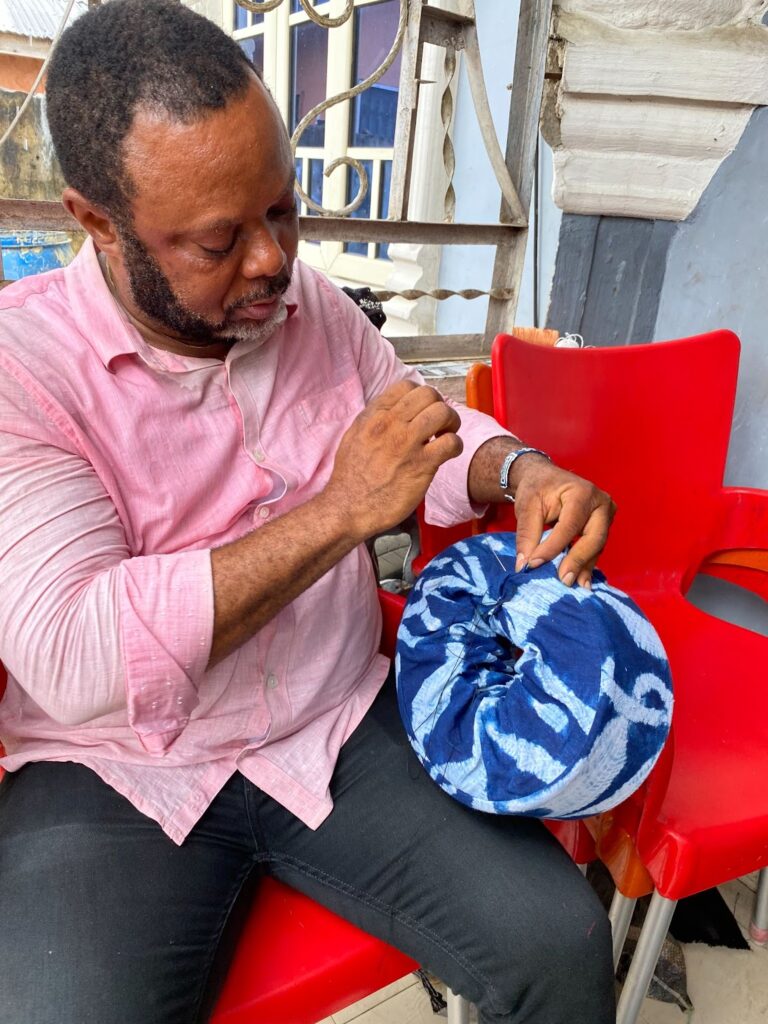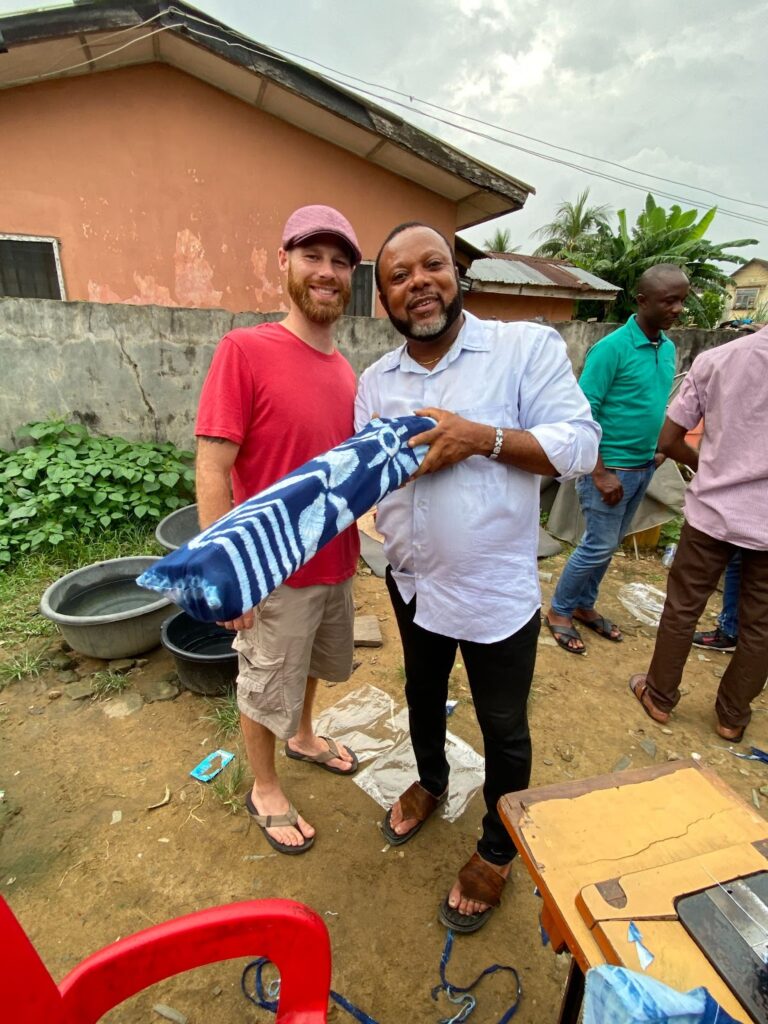
By Jordan A. Fenton
The past year provided an opportunity for a distinctive commission for the Richard and Carole Cocks Art Museum (RCCAM): a Nkanda masquerade made from ukara cloth in Nigeria by local artist, Chief Ekpenyong Bassey Nsa. Chief Bassey Nsa lives in the city of Calabar, southeast Nigeria and is a third-generation multimedia artist hailing from Efik culture. His father, late Chief Bassey Ekpenyong Nsa (1933-1997), was a master Ekpe artist during his lifetime and passed on the sacred knowledge of Ekpe arts to his son. The Ekpe secret society is a longstanding institution based in ancestor veneration that once served as the government for many cultures in southeast Nigeria and west Cameroon. Ukara cloth serves as a primary symbol of Ekpe and only members may wear the cloth during ceremony and occasion.
Chief Ekpenyong Bassey Nsa creating an arm tuft for the Idem Nkanda Ensemble, Calabar, Nigeria, 2022.
Photograph by Jordan A. Fenton.

“Masquerade” is a word used to describe an ensemble that obscures the identity of the wearer, as well as the act of performance itself. The body of the Nkanda masquerade is covered with a hand-dyed indigo ukara cloth. Before becoming ukara, the cloth starts out as a strip woven piece of cotton. The motifs on ukara cloth result from the hand-dyed process; before dying, motifs are tightly stitched with raffia threads, which serve as the resist when dyed. The stitch resist is achieved by sewing tightly woven raffia cord on the cotton. After being dyed in indigo pits, the raffia cord is cut out to reveal the white motifs which are known as nsibidi, the esoteric body of knowledge of the Ekpe secret society. Nsibidi consists of the “school set of knowledge” that members learn as they progress and advance into the Ekpe society. Nsibidi is an imaged and performed body of knowledge that explains the teachings and life lessons Ekpe emparts to its members.
Completely wrapped from head-to-toe with ukara cloth, Nkanda is a sacred masquerade that comes out to honor the recent passing of a local king or Ekpe lodge head. The Nkanda performance signals the transition of leadership during a difficult time following the death of a leader. Nkanda thus provides stability during an uncertain time. In Nigeria, when Nkanda is not used it is stored securely in a case out of sight and safe from direct sunlight, although part of the aesthetic of the masquerade is for the dyed cloth to naturally fade from the Sun during performance. Such a quality speaks to the longevity, history, and lifespan of the masquerade. During performance, Idem Nkanda’s choreography brings to life the ways in which the artistic philosophy defines a core aspect of the society. The dance speaks to how the Ekpe society is inherently artistic. Nkanda, in bearing nsibidi signs on its body, summarizes how art and knowledge are united; one is not complete without the other. Nkanda teaches us that masquerade arts from Africa are far from something solely relegated to myth and ritual, but are inherently based on a deep artistic philosophy. The meaning helps us understand why this is one of the most sacred and anticipated masquerades in Ekpe society.

Idem Nkanda created by Chief Ekpenyong Bassey Nsa, Calabar, Nigeria, 2022. Photograph by Jordan A. Fenton.
Chief Ekpenyong Bassey Nsa (Nigerian, b. 1973)
Idem Nkanda Ensemble from the Ekpe Society, 2022
Ukara cloth (dyed with indigo), foam support, thread, yarn, mirror, sequin, rubber cement, and peacock feathers
Art Museum commission through the Orpha Webster Art Fund with support of the Provost’s Office and the College of Creative Arts at Miami University, Ralph and Barbara Drake Bresler, and William Brenner. 2022.16.
I’m excited about this commission as it enhances RCCAM’s African art collection in significant ways. The museum now has three contemporary masquerades from Nigeria thanks to a unique relationship established between myself, and Chief Bassey Nsa of the Ekpe Society, Nigeria. Based on long-term fieldwork in Nigeria and initiation into the Ekpe society, we have developed a transparent relationship based on trust and reciprocity. Such a relationship permitted me to ethically commission ten complete masquerades from Chief Bassey Nsa for Western Museum collections between 2009 and 2022. Publications on this topic (2017 and 2023, see below) outline an ethical framework for their relationship, arguing that research between Western scholars and artists or cultural custodians who occupy formally colonial and underrepresented spaces, must hinge on ethical exchange and reciprocity in lieu of the typical model of foreign researchers taking knowledge for themselves without taking efforts to give back. This is all the more important as an example for museums that in the past may have acquired African art in a way that does not acknowledge the agency of artists, ignores the cultural context of an artwork, or obtains objects or artworks in unequitable ways that do not help sustain communities or their cultural traditions in the longer term. The effort endeavors to forge a dialogue between artists, researchers, and museums, ultimately attempting to change problematic collection practices.

Chief Ekpenyong Bassey Nsa and Dr. Jordan Fenton posing together with a piece of the unfinished Nkanda Ensemble, Calabar, Nigeria, 2022.
Photograph by Essien Eyo Effiong.
Being permitted to fully document all aspects of the creation of the Nkande Masquerade by Chief Bassey Nsa, this commission includes photographs and video footage. Furthermore, the commission of an Idem Nkanda ensemble is one of a kind – it is the only example in any museum collection in the world at the present time. With its array of multimedia materials, the commission is for use in teaching, research, and display at Miami University, and will also be presented in a traveling international exhibition being coordinated by the New Orleans Museum of Art called New Masks Now: Artists Innovating Masquerade in Contemporary West Africa, scheduled to open in 2025.
The Nkanda masquerade is featured as part of an exhibition at RCCAM in Fall 2023 entitled Heritage: Shaping Past, Present, Future and will be highlighted in one of the Heritage Symposium sessions. Prof. Fenton will present more about the Nkanda masquerade as part of a symposium taking place in connection with the exhibition. This artist commission would not have been possible without the support of the Orpha Webster Art Fund, the Office of the Provost, and the College of Creative Arts, in addition to Art Museum supporters Ralph and Barbara Drake Bresler and William Brenner.
To read more on this topic, see the following texts: Fenton, J.A. 2017. “Sustainable Futures: Ekpenyong Bassey Nsa and the Study of Traditional-Based African Artists,” African Art Journal, 50.4. and Fenton, J.A. 2023. “Touched and Changed: Self-Reflexivity and Fieldwork,” African Art Journal 56.2.

About the author: Jordan A. Fenton is Associate Professor of Art History at Miami University. He received a BA and MA from Kent State University before earning a PhD in art history from the University of Florida. He is a specialist of African Art History and has conducted research in Nigeria since 2008, investigating masquerade, secret societies, economics, and ethical ways to work with living artists from previously colonized spaces. Fenton was the faculty advisor for the collaborative student exhibition, More than an Object: Engaging the Broader Context of African Art in 2019. Fenton is a co-curator for the traveling exhibition, New Masks Now, opening 2025, and is author of Masquerade and Money in Urban Nigeria: The Case of Calabar (University of Rochester Press, 2022). He has served as Treasurer for the Arts Council of the African Studies Association and is a member of the RCCAM Membership Association Steering Committee.
SUPPORT FUTURE COLLECTIONS GROWTH Please visit the Art Museum Giving Page and consider a donation to the Orpha Webster Art Fund so that we can continue to purchase and commission artworks to enhance and develop RCCAM’s collections for teaching, display, and research.
